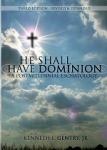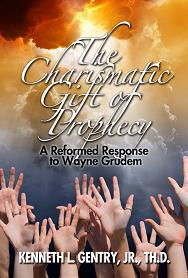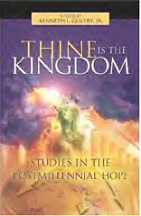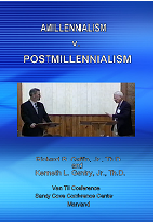MISGUIDED REJECTIONS OF POSTMILLENNIALISM (1)
 PMW 2023-081 by Greg L. Bahnsen
PMW 2023-081 by Greg L. Bahnsen
It must be observed that postmillennialism lost favor (and today remains held in disfavor) with conservative theologians for manifestly unorthodox and insufficient reasons. Extra-biblical reasoning, as well as lazy or poor scholarship, has intruded itself into Christian discussions of eschatology.
NEWSPAPER EXEGESIS
Alva J. McClain says of postmillennialism: “This optimistic theory of human progress had much of its own way for the half-century ending in World War I of 1914. After that the foundations were badly shaken; prop after prop went down, until today the whole theory is under attack from every side. Devout Postmillennialism has virtually disappeared.”
J. Barton Payne’s massive Encyclopedia of Biblical Prophecy mentions postmillennialism only once, and that merely in a footnote which parenthetically declares “two world wars killed this optimism.”
Merrill F. Unger dismisses postmillennialism in short order, declaring: “This theory, largely disproved by the progress of history, is practically a dead issue.”
John F. Walvoord tells us that “In eschatology the trend away from postmillennialism became almost a rout with the advent of World War II” because it forced upon Christians “a realistic appraisal of the decline of the church in power and influence.” Hence he says that “In the twentieth century the course of history, progress in Biblical studies, and the changing attitude of philosophy arrested its progress and brought about its apparent discard by all schools of theology. Postmillennialism is not a current issue in millenarianism.” He accuses it of failing to fit the facts of current history, of being unrealistic, and of being outmoded and out of step.
Jay Adams recognizes postmillennialism as a “dead issue” with conservative scholars, since it predicts a golden age while the world awaits momentary destruction; he agrees with the above authors that the “advent of two World Wars . . . virtually rang the death knell upon conservative postmillennialism.” Adams apparently offers his own opinion that Boettner’s long-range postmillennialism “is too difficult to grant when Christians must face the fact of hydrogen bombs in the hands of depraved humanity.”

He Shall Have Dominion
(paperback by Kenneth Gentry)
A classic, thorough explanation and defense of postmillennialism (600+ pages). Complete with several chapters answering specific objections.
See more study materials at: www.KennethGentry.com
Hal Lindsey’s The Late Great Planet Earth captures well the attitude of these previous writers, stating that “there used to be” a group called “postmillennialists” who were greatly disheartened by World War I and virtually wiped out by World War II. Lindsey’s (poorly researched) conclusion is this: “No self-respecting scholar who looks at the world conditions and the accelerating decline of Christian influence today is a ‘postmillennialist.’”
The sad fact is that our Christian brothers mentioned above should be embarrassed by what they have written and concluded; the attitude and reasoning they have set forth is woefully lacking as respectable Christian scholarship. By means of such newspaper exegesis, one could just as well discount the return of Christ in glory, saying “where is the promise of his coming?” (cf. II Peter 3:1-4). This reductio ad absurdum must be reckoned with. The fact that an era of gospel prosperity and world peace has not yet arrived would no more disprove the Bible’s teaching that such an era shall be realized (in the power of God’s spirit and the faithfulness of Christ’s church to its great commission) than the fact that Christ has not yet returned disproves the Bible’s teaching that such an event shall take place!
The only question is whether the Bible actually teaches these things. If it does, then “let God be true but every man a liar” (Rom. 3:4). The newspaper has no prerogative to challenge God’s word of truth. Nor do those who read the newspapers. As faithful disciples of Christ, we are to trust God as the sovereign controller over human history, “who works all things after the counsel of His own will” (Eph. 1:11), “declaring the end from the beginning and from ancient times things not yet done, saying, ‘My counsel shall stand, and I will accomplish all my purpose’” (Isa. 46:10), so that “none can stay his hand” (Dan. 4:35). With the Psalmist we should declare, “Whatever the Lord pleases, he does, in heaven and on earth” (115:3). If God says something is to happen, then it shall happen; it is to our discredit if we are men of little faith with respect to his promises.
Just imagine the following scenario: devout Simeon is in the temple looking for the consolation of Israel (cf. Luke 2), when a popular Jewish theologian comes in and tells him, “Simeon, your hope of a personal Messiah is a dead issue, an idealistic anachronism. Your unrealistic theory has been disproved by the course of history and discarded by all schools; it is out of date, outmoded, and no longer a current issue. No self-respecting scholar who looks at the world conditions and remembers the four hundred years of silence from God believes as you do; prop after prop has gone down, and the events that have come upon our nation have killed the optimism of your theory.” Would any conservative theologian say that Simeon’s belief had been refuted or incapacitated by such considerations? Would any think him justified in no longer treating it as a vital position worthy of scriptural consideration? Of course not. Likewise biblical postmillennialism cannot be thus dismissed.
MISREPRESENTATION
Postmillennialism has not only been discarded in this century on clearly unorthodox grounds; it has also been made a straw man so that modern advocates of the other schools of interpretation can easily knock it down and get on to other interests. The worst possible interpretation is put on postmillennial tenets, or the eccentric aspect of some postmillennial writer’s position is set forth as representing the basic school of thought.
As instances of these procedures we can note the following. Hal Lindsey says that postmillennialists believe in the inherent goodness of man, and Walvoord says that the position could not resist the trend toward liberalism. He also accuses it of not seeing the kingdom as consummated by the Second Advent. William E. Cox claims that postmillennialism is characterized by a literal interpretation of Revelation 20. Adams portrays the postmillennialist as unable to conceive of the millennium as coextensive with the church age or as a present reality, for he (according to Adams) must see it as exclusively future – a golden age just around the corner.
All of the above claims are simply inaccurate. The Calvinist, Loraine Boettner, certainly does not believe in man’s inherent goodness, and B. B. Warfield can hardly be accused of not resisting liberalism. That a. A. Hodge did not see the second coming of Christ as the great day of consummation is preposterous. J. Marcellus Kik and many others insisted on a figurative interpretation of Revelation 20. Certain sixteenth- and seventeenth-century Dutch theologians, as well as Jonathan Edwards and E. W. Hengstenberg, were all postmillennialists who saw the millennium as coeval with the interadventual age (in which there would be progressive growth for the church in numbers and influence). Charles Hodge, Snowden, and Boettner were all postmillennialists who explained that the growth of Christ’s kingdom in the world suffers periodic crises, and Boetner has especially stressed the fact that it grows by imperceptible degrees over a long period.
Finally, anyone who thinks of postmillennialism as a utopian position misunderstands one or the other in their historically essential principles. Indeed, a chapter in Boettner’s book, The Millennium, is entitled, “The Millennium not a Perfect or Sinless State,” contrary to the misrepresentations of Vos. Therefore, the recent opponents of postmillennialism have not been fair to its genuine distinctives, but rather have misrepresented it as a general category of interpretation. This surely provides no firm ground for rejecting the position.
[image error]For more information and to order click here.
" data-image-caption="" data-medium-file="https://postmillennialismtoday.files...." data-large-file="https://postmillennialismtoday.files...." class="alignright size-full wp-image-209" src="https://postmillennialismtoday.files...." alt="Navigating the Book of Revelation: Special Studies on Important Issues" />Navigating the Book of Revelation (by Ken Gentry)
Technical studies on key issues in Revelation, including the seven-sealed scroll, the cast out temple, Jewish persecution of Christianity, the Babylonian Harlot, and more.
See more study materials at: www.KennethGentry.com
TWO-EDGED CRITICISMS
A third infelicitous way in which postmillennialism has been disposed of is by means of (allegedly) critical considerations which in fact apply as much to the other eschatological positions as to postmillennialism. For example, it has been contended that there is incoherence among various postmillennials rather than a unified theology, and in connection with this criticism it is observed that postmillennialism is adhered to by extremely divergent theological schools. However, this is just as true of amillennialism and premillennialism; numerous details differ among proponents of these positions (indeed, one is inclined to think that they are more extensive and significant differences than those among proponents of these positions (indeed, one is inclined to think that they are more extensive and significant differences than those among postmillennialists), but this says nothing about the truth of their central tenets.
Then again, postmillennialism is sometimes thought to be falsified through imputing guilt to it by association, observing that it has sometimes been held in some form by unitarians and liberals. But “premillennialism” has been advocated by the apostate Jews and modern cultists, and “amillennialism” is endorsed by neo-orthodox dialectical theology. The fact that there are functional similarities between various evangelical and heretical theologians does not in itself settle the key question of which position is taught by God’s word; whichever millennial position is scriptural, it is nonetheless subject to misuse and inappropriation. Hence the use of one of these positions by an unorthodox writer does nothing in itself to discredit the position.
FIGURATIVE VS. LITERAL
A further criticism which cannot be applied uniquely to postmillennialism is that it interprets biblical prophecy both figuratively and literally. The premillennialists see symbolic interpretation as a failure of nerve, and amillennialists take literal understanding of prophecy as crude and insensitive. But the fact remains that none of the three schools interprets biblical prophecy exclusively in either a literal or figurative fashion. (And, by the way, nobody really adheres to the rule, “Literal where possible,” as is evident from the respective treatments of the beast of Revelation, which could possibly be a literal monster but obviously is not.)
All three schools end up finding both kinds of literature in the prophetic passages, and it is dishonest to give an opposite impression. If anything, the fact that postmillennialism is seen as too literal by amillennialists and too figurative by premillennialists perhaps suggests (certainly does not prove) that it alone has maintained a proper balance. The upshot is this: the charge of subjective spiritualization or hyperliteralism against any of the three eschatological positions cannot be settled in general; rather, the opponents must get down to hand-to-hand exegetical combat on particular passages and phrases.
Click on the following images for more information on these studies:



Kenneth L. Gentry Jr.'s Blog
- Kenneth L. Gentry Jr.'s profile
- 85 followers



